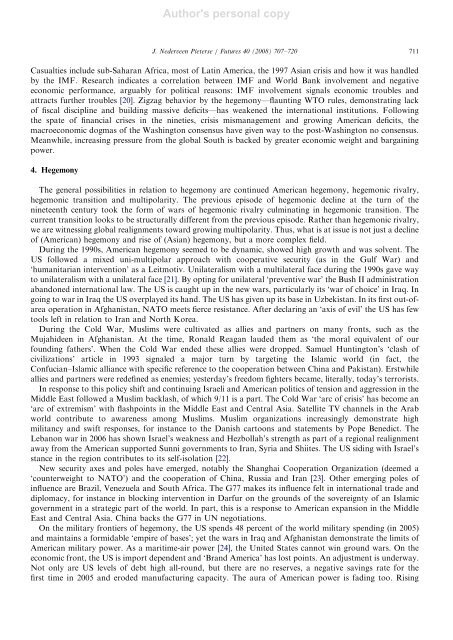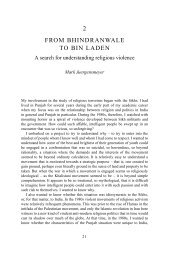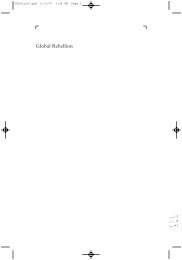New Glob Fu JFTR1275.pdf - Jan Nederveen Pieterse
New Glob Fu JFTR1275.pdf - Jan Nederveen Pieterse
New Glob Fu JFTR1275.pdf - Jan Nederveen Pieterse
Create successful ePaper yourself
Turn your PDF publications into a flip-book with our unique Google optimized e-Paper software.
Author's personal copy<br />
Casualties include sub-Saharan Africa, most of Latin America, the 1997 Asian crisis and how it was handled<br />
by the IMF. Research indicates a correlation between IMF and World Bank involvement and negative<br />
economic performance, arguably for political reasons: IMF involvement signals economic troubles and<br />
attracts further troubles [20]. Zigzag behavior by the hegemony—flaunting WTO rules, demonstrating lack<br />
of fiscal discipline and building massive deficits—has weakened the international institutions. Following<br />
the spate of financial crises in the nineties, crisis mismanagement and growing American deficits, the<br />
macroeconomic dogmas of the Washington consensus have given way to the post-Washington no consensus.<br />
Meanwhile, increasing pressure from the global South is backed by greater economic weight and bargaining<br />
power.<br />
4. Hegemony<br />
ARTICLE IN PRESS<br />
J. <strong>Nederveen</strong> <strong>Pieterse</strong> / <strong>Fu</strong>tures 40 (2008) 707–720 711<br />
The general possibilities in relation to hegemony are continued American hegemony, hegemonic rivalry,<br />
hegemonic transition and multipolarity. The previous episode of hegemonic decline at the turn of the<br />
nineteenth century took the form of wars of hegemonic rivalry culminating in hegemonic transition. The<br />
current transition looks to be structurally different from the previous episode. Rather than hegemonic rivalry,<br />
we are witnessing global realignments toward growing multipolarity. Thus, what is at issue is not just a decline<br />
of (American) hegemony and rise of (Asian) hegemony, but a more complex field.<br />
During the 1990s, American hegemony seemed to be dynamic, showed high growth and was solvent. The<br />
US followed a mixed uni-multipolar approach with cooperative security (as in the Gulf War) and<br />
‘humanitarian intervention’ as a Leitmotiv. Unilateralism with a multilateral face during the 1990s gave way<br />
to unilateralism with a unilateral face [21]. By opting for unilateral ‘preventive war’ the Bush II administration<br />
abandoned international law. The US is caught up in the new wars, particularly its ‘war of choice’ in Iraq. In<br />
going to war in Iraq the US overplayed its hand. The US has given up its base in Uzbekistan. In its first out-ofarea<br />
operation in Afghanistan, NATO meets fierce resistance. After declaring an ‘axis of evil’ the US has few<br />
tools left in relation to Iran and North Korea.<br />
During the Cold War, Muslims were cultivated as allies and partners on many fronts, such as the<br />
Mujahideen in Afghanistan. At the time, Ronald Reagan lauded them as ‘the moral equivalent of our<br />
founding fathers’. When the Cold War ended these allies were dropped. Samuel Huntington’s ‘clash of<br />
civilizations’ article in 1993 signaled a major turn by targeting the Islamic world (in fact, the<br />
Confucian–Islamic alliance with specific reference to the cooperation between China and Pakistan). Erstwhile<br />
allies and partners were redefined as enemies; yesterday’s freedom fighters became, literally, today’s terrorists.<br />
In response to this policy shift and continuing Israeli and American politics of tension and aggression in the<br />
Middle East followed a Muslim backlash, of which 9/11 is a part. The Cold War ‘arc of crisis’ has become an<br />
‘arc of extremism’ with flashpoints in the Middle East and Central Asia. Satellite TV channels in the Arab<br />
world contribute to awareness among Muslims. Muslim organizations increasingly demonstrate high<br />
militancy and swift responses, for instance to the Danish cartoons and statements by Pope Benedict. The<br />
Lebanon war in 2006 has shown Israel’s weakness and Hezbollah’s strength as part of a regional realignment<br />
away from the American supported Sunni governments to Iran, Syria and Shiites. The US siding with Israel’s<br />
stance in the region contributes to its self-isolation [22].<br />
<strong>New</strong> security axes and poles have emerged, notably the Shanghai Cooperation Organization (deemed a<br />
‘counterweight to NATO’) and the cooperation of China, Russia and Iran [23]. Other emerging poles of<br />
influence are Brazil, Venezuela and South Africa. The G77 makes its influence felt in international trade and<br />
diplomacy, for instance in blocking intervention in Darfur on the grounds of the sovereignty of an Islamic<br />
government in a strategic part of the world. In part, this is a response to American expansion in the Middle<br />
East and Central Asia. China backs the G77 in UN negotiations.<br />
On the military frontiers of hegemony, the US spends 48 percent of the world military spending (in 2005)<br />
and maintains a formidable ‘empire of bases’; yet the wars in Iraq and Afghanistan demonstrate the limits of<br />
American military power. As a maritime-air power [24], the United States cannot win ground wars. On the<br />
economic front, the US is import dependent and ‘Brand America’ has lost points. An adjustment is underway.<br />
Not only are US levels of debt high all-round, but there are no reserves, a negative savings rate for the<br />
first time in 2005 and eroded manufacturing capacity. The aura of American power is fading too. Rising





